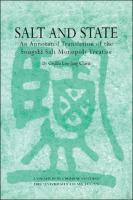Salt and State
An Annotated Translation of the Songshi Salt Monopoly Treatise
Abstract
Salt and State is an annotated translation of a treatise on salt from Song China. From its inception in the Han dynasty (206 B.C.–220 A.D.), the salt monopoly was a key component in the Chinese government's financial toolkit. Salt, with its highly localized and large-scale production, was an ideal target for bureaucratic management. In the Song dynasty (960–1279), fiscal pressures on the government had intensified with increased centralization and bureaucratization. A bloated administration and an enormous standing army maintained against incursions by aggressive steppe neighbors placed tremendous strain on Song finances. Developing the salt monopoly seemed a logical and indeed urgent strategy, but each actor in this plan—the emperor, local officials, monopoly administrators, producers, merchants, and consumers—had his own interests to protect and advance. Thus attempts to maximize the effectiveness of the monopoly meant frequent policy swings and led to levels of corruption that would ultimately undo the Song. Unlike other contemporary sources, the Songshi treatise organizes its subject into an intelligible and detailed narrative, elucidating special terminology, the bureaucracy and its processes, and debates relating to Chinese finance and politics, as well as the salt industry itself. Professor Chien's extensive annotation relies on parallel histories that corroborate and supplement the Songshi account, together providing a comprehensive study of this important institution in China's premodern political economy.
Keywords
Sociology and anthropologyDOI
10.3998/mpub.19833Publisher
University of Michigan PressPublisher website
https://www.press.umich.edu/Publication date and place
Ann Arbor, 2020Grantor
Imprint
U OF M CENTER FOR CHINESE STUDIESSeries
Michigan Monographs In Chinese Studies, 99Classification
Sociology and anthropology


 Download
Download